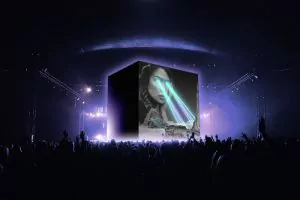Subscribe to our Telegram channel

Analytics: NFT tickets are already used by about 18% of event organizers
NFTs have already started to have a profound impact on the arts, brand promotion, and gaming industries, but the next interesting use case could come from the world of ticketing.
The concept of non-fungible tokens (NFTs) was introduced in 2015 and first gained popularity in 2017, when many well-known digital collectibles such as CryptoPunks and EtherRock were created.
NFTs gained popularity among leading sports clubs quite early on, but burst into mass popularity after the works of digital artist Beeple were sold as NFTs for more than $ 69 million. The situation with Beeple attracted worldwide attention and became a breakthrough movement for the NFT ecosystem.
Today, most popular brands, celebrities, sports stars, and influencers have succumbed to the NFT craze. While many believed that the hype surrounding the market would be the beginning of the end of the bubble, the NFT ecosystem has experienced rapid expansion beyond the market for conventional digital collections. For example, the Ministry of Digital Transformation created a war museum, which not only once again drew attention to the problems of the war in Ukraine, but also helped raise funds.
Gaming is another key industry that NFTs have had a significant impact on, with the «play to earn» (P2E) model and integrated NFT rewards gaining popularity since last year. Games like Axie Infinity have started to feed entire segments of the population in several countries. Therefore, experts predict that within 10 years, most games will switch to the P2E model.
Although digital collectibles and the gaming industry have become two of the most well-known use cases for NFTs, there are several other industries where the use of NFT tokens is growing.
A prime example is the ticketing industry, which is expected to be overhauled by the integration of NFTs.
Although the ticketing market has become quite digital over the past few years, it is still very centralized, which contributes to the growth of black markets, speculators, and does not have the best effect on communication between the author and his fans.
In today’s world, tickets to any major concert or event are bought out in a few minutes, often using specialized bots, and then sold at an inflated price to those who could not otherwise buy a ticket for the regular price.
In many cases, «scalpers» (as these speculators are called today) even sell fakes, with customers having no way to check whether the tickets are genuine or not before buying.
NFTs have authentication as part of the smart contract because they store data on the blockchain. The same mechanism can be applied by placing tickets on the blockchain, which will not only ensure the authenticity of the ticket but also resolve the issue of whether it is sold by a legitimate organizer.
NFTs also have the potential to enter the secondary ticket market.
For a long time, the secondary market has been largely inaccessible to organizers, venues, and artists. Unregulated and speculative, it affects both fans frustrated by high prices and artists depressed by an unhappy fanbase.
With NFT tickets, this problem may disappear. Artists and event organizers can create smart contracts that regulate the resale of their tickets.
The benefits of NFTs can vary:
- royalties coming from resale
- upper or lower price limits
- all kinds of useful add-ons in NFTs, bonuses for ownership
With the help of NFT tickets, the community becomes much closer to an artist or, for example, a favorite sports team. This means that they play a bigger role in the artist’s life or the club’s decisions.
Such tickets can be a collector’s item, but they can also be a gift with all kinds of privileges — you can provide access to certain seats at the event or award a T-shirt, treat them to a beer, give them a signed poster — as your event budget allows.
NFTs bridge the gap between different types of experiences. The same NFT can be used to access a concert, and it can also become an access card to your hotel room, a ticket to a nearby theme park, and even a key to a rented car.
Mike Dragan, COO of the NFT Oveit ticketing marketplace, assures that NFT tickets are already in high demand, and their market value can exceed hundreds of billions of dollars:
«According to our data, 18% of ticketed events are using or considering using NFTs as a way to enhance their guests' experience. This figure is up from just 2% in July 2021. We expect this number to grow even further over the next year as the technology is adopted and crypto wallets become more popular and easy to use.
We think that the NFT ticketing market will reach 25% of the total ticketing market by 2017 — and reach approximately $ 18.5 billion — in the live events industry alone. And in some time, the market will come to the tourism and restaurant industries as well."
In conclusion, the author of the book Black Swan, Nassim Taleb, believes that the probability of the NFT market collapse is very high. At the same time, other analysts are quite the opposite and are confident in an imminent market boom after NFTs are launched on the Instagram platform.

